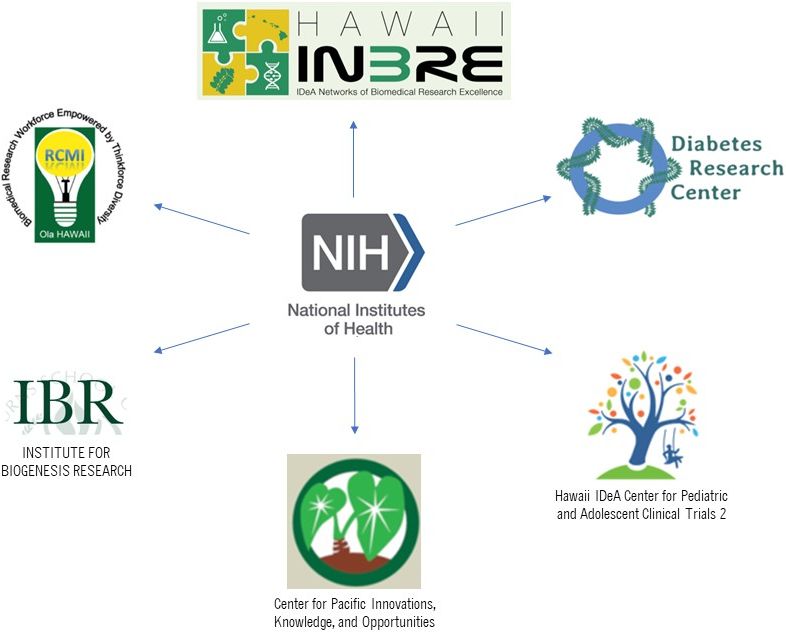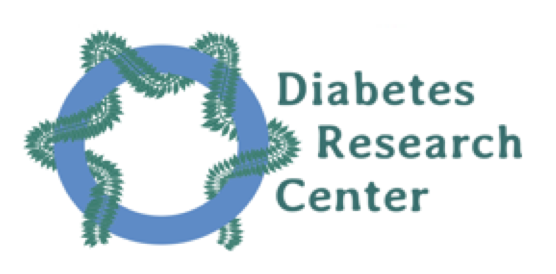
The research capacity at the John A. Burns School of Medicine has benefited from large investments from the National Institutes of Health (NIH), a federal funding agency, through infrastructure-building grants. Active infrastructure grants awarded to our medical school include the following:
 The Center for Pacific Innovations, Knowledge, and Opportunities (PIKO) uses a team-science approach to build a robust clinical and translational research (CTR) infrastructure that directly improves the health and wellbeing of indigenous Pacific People (IPP), defined as Native Hawaiians, Other Pacific Islanders, and Filipinos, and other underserved populations. Through collaborations among academic institutions and a statewide network of stakeholders, PIKO will convert basic discoveries into real-world solutions that improve IPP health and increase the number of junior and other investigators, particularly from IPP backgrounds, engaged in CTR careers. Led by Keaweʻaimoku Kaholokula, PhD, and Neal Palafox, MD, MPH.
The Center for Pacific Innovations, Knowledge, and Opportunities (PIKO) uses a team-science approach to build a robust clinical and translational research (CTR) infrastructure that directly improves the health and wellbeing of indigenous Pacific People (IPP), defined as Native Hawaiians, Other Pacific Islanders, and Filipinos, and other underserved populations. Through collaborations among academic institutions and a statewide network of stakeholders, PIKO will convert basic discoveries into real-world solutions that improve IPP health and increase the number of junior and other investigators, particularly from IPP backgrounds, engaged in CTR careers. Led by Keaweʻaimoku Kaholokula, PhD, and Neal Palafox, MD, MPH. The team of scientists and physicians in the Diabetes Research Center conducts research in diabetes and pre-diabetes with a focus on Hawaiʻi’s multi-ethnic population. Led by Mariana Gerschenson, PhD.
The team of scientists and physicians in the Diabetes Research Center conducts research in diabetes and pre-diabetes with a focus on Hawaiʻi’s multi-ethnic population. Led by Mariana Gerschenson, PhD. The Hawaiʻi IDeA Center for Pediatric and Adolescent Clinical Trials 2 (HIPACT2) builds upon the success of HIPACT1 and is a continuing partner in the Environmental Influences on Child Health Outcomes (ECHO) IDeA States Pediatric Clinical Trials Network (ISPCTN). HIPACT2 will increase opportunities for faculty development, participate in collaborative multicenter clinical trial research, and engage underserved communities to improve health outcomes in Hawaiʻi and across the nation. Led by Venkataraman Balaraman, MD.
The Hawaiʻi IDeA Center for Pediatric and Adolescent Clinical Trials 2 (HIPACT2) builds upon the success of HIPACT1 and is a continuing partner in the Environmental Influences on Child Health Outcomes (ECHO) IDeA States Pediatric Clinical Trials Network (ISPCTN). HIPACT2 will increase opportunities for faculty development, participate in collaborative multicenter clinical trial research, and engage underserved communities to improve health outcomes in Hawaiʻi and across the nation. Led by Venkataraman Balaraman, MD. The Hawaiʻi Institutional Development Award (IDeA) Network of Biomedical Research Excellence (HI-INBRE) works to strengthen and expand biomedical research capacity, nurture research collaborations, and enhance professional development of faculty and students in Hawaiʻi. The current cycle (INBRE V) is led by Peter Hoffmann, PhD.
The Hawaiʻi Institutional Development Award (IDeA) Network of Biomedical Research Excellence (HI-INBRE) works to strengthen and expand biomedical research capacity, nurture research collaborations, and enhance professional development of faculty and students in Hawaiʻi. The current cycle (INBRE V) is led by Peter Hoffmann, PhD.
 The long-term goal of the Institute for Biogenesis Research is to develop the IBR into a world-renowned institute in reproductive biology focusing on reproductive and developmental biology research with an emphasis on assisted reproductive techniques. Led by W. Steven Ward, PhD.
The long-term goal of the Institute for Biogenesis Research is to develop the IBR into a world-renowned institute in reproductive biology focusing on reproductive and developmental biology research with an emphasis on assisted reproductive techniques. Led by W. Steven Ward, PhD. Ola HAWAIʻI supports multi-disciplinary teams of investigators and community collaborators as they conduct basic biomedical, behavioral and clinical research on the differing health outcomes and the most effective solutions to address those among the underserved, multiethnic populations in Hawaii. Led by Jerris Hedges, MD, MS, MMM and Noreen Mokuau, PhD.
Ola HAWAIʻI supports multi-disciplinary teams of investigators and community collaborators as they conduct basic biomedical, behavioral and clinical research on the differing health outcomes and the most effective solutions to address those among the underserved, multiethnic populations in Hawaii. Led by Jerris Hedges, MD, MS, MMM and Noreen Mokuau, PhD.
Center for Cardiovascular Research
https://ccr.jabsom.hawaii.edu/
The Pacific Center for Emerging Infectious Diseases Research
https://pceidr.jabsom.hawaii.edu
The Center for Native and Pacific Health Research
(NIMHD Exploratory Centers of Excellence)
https://native.jabsom.hawaii.edu/